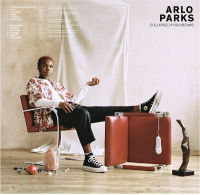Arlo Parks: Collapsed In Sunbeams
Jason Williamson of Sleaford Mods grabs you by the shoulders and shakes you; Arlo Parks, by comparison, presses gently on your arm with her forefinger, but even through your clothes, she touches right on that bruise you’ve been hiding. Arlo Parks, astoundingly, is 20 years old - my turntables are older than her - and yet she deftly unravels lyrical miniatures of youthful lives with breathtaking maturity. The singles “Hurt” and “Black Dog” haunted the isolated homes of lockdown UK on BBC Radio 6Music for much of 2020. Alexis Petridis, writing in “The Guardian”, highlighted the curse of Arlo Parks being labelled “voice of a generation”. Parks has certainly not claimed the title, and while she describes herself as an empath, she asserts she is speaking only for herself. I can imagine countless people her age clamoring to be “voice of a generation”, and they are automatically rendered unsuitable for the job by virtue of desiring it.
Parks’ lyrics are gentle, intimate and insightful, and rarely rely on metaphor and simile. Instead, she observes tender, vivid details in miniature, with clarity and poise. These observations can be startling and delicate, sensitively rendering teenage queer experience. An adolescent world is rendered with profound maturity, woven through with a perception of the adult world through adolescent eyes. Colors are always bruise-tinged; bluish, violet, sage green, purple. However, her words are not confrontational or enraged; instead, there is understated disaffection. She sketches intimacy best of all, bittersweet, tentative, hopeful or hopeless. Parks’ vocal delivery has a dusty purity, demonstrating lightness and pinpoint accuracy; even tempered, precise in tone. The vocal recording is authentic and eloquent, with soft harmonies and frank, conversational passages.
“Hurt” opens with entrancing, blocky rhythms, ringing toms, brushed snares offsetting a loping bass, narrating youthful emptiness. “Hope” recalls a deep anxiety evoked by a midnight piano phrase and distant guitar in cavernous reverb, illustrating families failing to understand intensifying mental health issues. “Caroline” opens with a prosaic and yet deliciously observed turn of phrase - “I was waiting for the bus one day, saw a fight between a artsy couple escalate”. “Black Dog” is a miraculous dissection of the fearful grind of helping a mentally ill friend, the hopefulness and the traumas - “I’d lick the grief right off your lips, you do your eyes like Robert Smith, sometimes it seems like you won’t survive this, and honestly it’s terrifying”. “For Violet” is brooding, claustrophobic and insistent, the bond between friends contrasted with an unsympathetic parent - “sarcastically charming, wonder if he realized how much he hurts his kids”.
Most of the album is produced in collaboration with Gianluca Buccellati, with contributions from Paul Epworth and Bad Sounds. This is a languid collection, tranquil but not tranquilized, stoned yet lucid. There is a tight instrumental palette - guitar, piano, acoustic drums, muted bass and sparse rhythmic loops. The recording combines dark, chilly reverb with the warmth and proximity of Parks’ vocals to evoke both isolation and intimacy. Some of the writing and recording process was completed in a rented London flat, perhaps permitting an unhurried approach compared to a recording studio. This may also explain the hushed tone and sedate composure of the instrumentation, the absence of stridency. The compositions are often poignant, but not plaintive; emotive, but not expressive or showy. The drums snap crisply without commanding the soundstage, their sleepy rhythms shuffling just behind the beat. There is greater bass punch and momentum at the end of side 2 in “Bluish” and “Portra 400”. There are some hollow bass sonics in places, and the fake ‘vinyl’ surface noise in “For Violet” is unnecessary. Overall though, this is a coherent, warm production with a lo-fi edge, sensitively woven around the upfront vocals and harmonies.
My (slightly dished) pressing on a ‘deep red’ 180g disc is warm with very slight surface noise. Apart from occasional sibilance, it is not brash, but neither is it very dynamic. The record sounds a little flat compared to the supplied MP3 download; alongside it the vinyl lacks some brightness and punch. The packaging is stylish, with analogue photography, tinted inners, heavyweight cardstock on both the outer and full-color printed inner sleeves, plus full lyrics and credits. There is a comprehensive array of vinyl pressings, colored cassettes and digital formats, depending on your territory.
Closing tracks “Bluish” and “Portra 400” hint at a slightly more open production direction; will this confident collection of songs continue blossoming further into even deeper sophistication, more eclectic genre experimentation, a more extensive sonic palette? I believe so, and we are fortunate to witness the evolution of this poet and songwriter.
Another Transgressive Records artist, Glasgow-born musician and producer SOPHIE, sadly died on January 30, 2021, in Athens, Greece, following a tragic accident. Acclaimed for their innovative production abilities and transgender activism, SOPHIE worked with Madonna and Charlie XCX and released a Grammy award-nominated album on Transgressive in 2018, “Oil of Every Pearl's Un-Insides”. RIP, SOPHIE XEON, 1986-2021—M.D.



